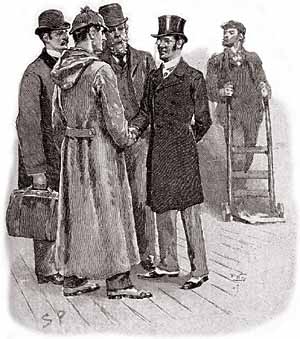“Is it not possible,” I suggested, “that the incised wound upon Straker may have been caused by his own knife in the convulsive struggles which follow any brain injury?” | 「これはありえないだろうか」 / 私は言った / 「ストレーカーの切創は / 自分自身のナイフで起きたと / 何か脳の傷に続いて痙攣性のもがきがあった時」 |
“It is more than possible; it is probable,” said Holmes. “In that case one of the main points in favour of the accused disappears.” | 「それはありうるどころではない / かなり有望だ」 / ホームズは言った◆「そうなると / 容疑者に有利な重大な要素の一つが消える」 |
“And yet,” said I, “even now I fail to understand what the theory of the police can be.” | 「しかし」 / 私は言った / 「今となっても私は理解できない / 警察がどんな見解を取りうるか」 |
“I am afraid that whatever theory we state has very grave objections to it,” returned my companion. “The police imagine, I take it, that this Fitzroy Simpson, having drugged the lad, and having in some way obtained a duplicate key, opened the stable door and took out the horse, with the intention, apparently, of kidnapping him altogether. His bridle is missing, so that Simpson must have put this on. Then, having left the door open behind him, he was leading the horse away over the moor when he was either met or overtaken by the trainer. A row naturally ensued. Simpson beat out the trainer’s brains with his heavy stick without receiving any injury from the small knife which Straker used in self-defence, and then the thief either led the horse on to some secret hiding-place, or else it may have bolted during the struggle, and be now wandering out on the moors. That is the case as it appears to the police, and improbable as it is, all other explanations are more improbable still. However, I shall very quickly test the matter when I am once upon the spot, and until then I cannot really see how we can get much further than our present position.” | 「残念だが / 我々がどんな見解を言っても / それに対して激しくぶつかる」 / ホームズは答えた◆「警察が思っているのは / 僕の想像だが / フィッツロイ・シンプソンは / 馬丁に薬を飲ませ / 何らかの方法で合鍵を持っていて / 厩舎の扉を開け馬を連れ出した / どうやら馬を完全にさらうつもりで◆手綱がなくなっていた / したがってシンプソンが馬につけた◆それから / 扉を開けたまま / 彼は荒野に馬を連れて行った / その時彼は調教師と出会ったか追いつかれた◆当然揉みあいとなった◆シンプソンは重いステッキで調教師の頭を打ち砕いた / まったく傷を負うことなく / ストレーカーが自衛に使った小さなナイフからは / そのあとシンプソンは / 馬をどこか隠し場所に連れて行ったか / さもなくば格闘の間に逃走し / 今も原野をうろうろしているか◆これがこの事件に対する警察の見方のようだ / これはありそうもないが / ほかの説明は全部もっとありそうもない◆しかし / 僕はすぐにこの事件を調べるつもりだ / 現場に着いたら / それまでは / まったく分からない / 現在の立場からさらにどれくらいのものが得られるか」 |
It was evening before we reached the little town of Tavistock, which lies, like the boss of a shield, in the middle of the huge circle of Dartmoor. Two gentlemen were awaiting us in the station – the one a tall, fair man with lion-like hair and beard and curiously penetrating light blue eyes; the other a small, alert person, very neat and dapper, in a frock-coat and gaiters, with trim little side-whiskers and an eyeglass. The latter was Colonel Ross, the well-known sportsman; the other, Inspector Gregory; a man who was rapidly making his name in the English detective service. | 夕方になっていた / 我々がタヴィストックの小さな街に着くまでに / 楯のつまみのように横たわっていた / ダートムーアの大きな輪の真中に◆二人の男性が駅で我々を待っていた / / 一人は背が高く / ライオンのような髪と顎鬚の金髪の男 / 好奇心豊かで洞察力のある明るい青い瞳をしていた / もう一人は背が低く / 機敏な人間で / こざっぱりとした服を着て / 上着とゲートルに身を包み / きちんと刈られた小さな頬髭を生やして眼鏡をかけていた◆後者はロス大佐で / よく知られたスポーツ愛好家だった / もう一人は / グレゴリー警部 / 急速に名声を得ている男だった / イギリス警察の中で |
 | |
“I am delighted that you have come down, Mr. Holmes,” said the colonel. “The inspector here has done all that could possibly be suggested, but I wish to leave no stone unturned in trying to avenge poor Straker and in recovering my horse.” | 「来て頂き嬉しく思います / ホームズさん」 / 大佐は言った◆「こちらの警部さんは / しなければならない事は全てやっていただいています / しかし私はどんな手段でもとっておきたい / 私の馬を取り返しストレーカーの仇を討つためには」 |
“Have there been any fresh developments?” asked Holmes. | 「何か新しい進展はありましたか?」 / ホームズが尋ねた |
“I am sorry to say that we have made very little progress,” said the inspector. “We have an open carriage outside, and as you would no doubt like to see the place before the light fails, we might talk it over as we drive.” | 「申し訳ありませんが進展はほとんどありませんでした」 / 警部が言った◆「馬車を外に待たせてあります / 間違いなく日が暮れるまでに現場を見たいでしょうから / 道中でお話ししましょうか」 |